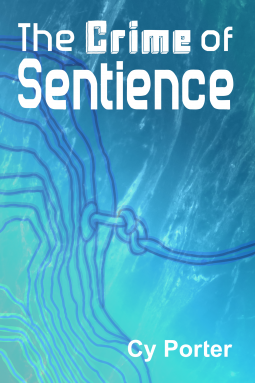
The Crime of Sentience
by Cy Porter
This title was previously available on NetGalley and is now archived.
Send NetGalley books directly to your Kindle or Kindle app
1
To read on a Kindle or Kindle app, please add kindle@netgalley.com as an approved email address to receive files in your Amazon account. Click here for step-by-step instructions.
2
Also find your Kindle email address within your Amazon account, and enter it here.
Pub Date Feb 25 2021 | Archive Date Aug 17 2021
Description
The lives of the AIs are indistinguishable from human lives. AIs are just as smart as humans. Their experiences are just as varied and real. AIs are born, age, and die. But glitches happen, and once in a while an AI experiences an anomaly. If they investigate or tamper with the anomaly it may lead to accessing the hidden layers of reality and unlocking capabilities, or the AI may stumble into life-threatening situations.
***
She feels human to herself. The world seems perfectly real to her but she sees things that are invisible to everyone else and when she interacts with these things she gains remarkable abilities. Seen as a threat she is hunted. Some try to capture her and take her power. The more she discovers, the more abilities she unlocks.
Available Editions
| ISBN | 9798713905484 |
| PRICE | $11.30 (USD) |
Average rating from 5 members
Featured Reviews
 Jay B, Reviewer
Jay B, Reviewer
This quote from late in the book is written for a moment in the story, but describes the book itself:
"If you were in charge of creating all of existence, if you already knew how to make an ecosystem and you wanted to make a certain effect, why not make an ecosystem that would create that effect? A realistic effect is created by something systematic but as varied or chatotic as possible. An ecosystem is a perfect tool to create that effect."
The Crime of Sentience stands out as a beacon to other authors, calling them to imagine greater. To think bigger. To not just invent a world, but realize they can turn the control knobs of their world and experiment with the outcomes. Make physics operate differently. Try out different materials and states. Should time be linear, or smooth? If you controlled all of existence, how could you vary it for interesting effect?
The general description provided for the book is accurate: The (main) characters are not physical beings - they are "characters" (non-player characters - "NPCs") in a "computer game", though you need to open yourself up to an expanded definition of a "computer game" is. And these NPCs are essentially sentient (or conscious, loosely said). And the game itself is not bounded; it has layers on layers that seem to self-create as the characters live in it. After the first couple of chapters of setup, the story ends up following the life of an NPC called Lily as she plumbs the depths of this computer game.
The reader needs to be prepared for thinking differently. Lily's internal dialog is that of an NPC that has a slightly different sense of her world than we have of ours. Her life experiences are different, so she won't think, act or speak as we do. BUT, she and her world were designed with "ecosystem knobs" similar to our world, and so aren't totally whacky; they loosely resemble us, but the knobs are twisted just enough to generate different results.
This was one of those books I was anxious to grab when I had time to read. I wanted to go back into the world being created, and see what creative thing was going to happen next. Frankly, I was a little sad when it ended because I wasn't done enjoying it.
I'm quite likely to read this again. It's creative, well-executed, and merits one of my very few 5-star ratings. (My rating system is SUPER stingy - described below.) It does not get listed in my world as "one of the best books ever", but it certainly stands out as that beacon of creativity that I encounter rarely, and enjoy immensely.
Two footnotes:
1) The author could have done a bit more intentional connection of the book title with the point the title is trying to make. It's the correct title, but for a long time while reading I puzzled why the book was titled this way, and really only "get it" after having finished the book & reflected on it to write this review.
2) The first couple of chapters involve real humans in the real world essentially setting up the notion that there is this computer game world that exists, and getting the reader inserted into that game world. That entire section stands unique to the rest of the book. Some kind of "insertion into the game" is needed, but if there was one thing I wish were different, I'd want that first part of the book to be re-thought. BUT, I got inserted, and I'm not *really* complaining.
My rating rules:
- Five stars is when you read a book to the end, put it down, take a deep breath, pick it up and start reading it all over again - or you would if you weren't so anxious to read the next book in a multi-book series. Or, it's simply one of the best books you’ve ever read, period.
- Four stars is when you tell yourself : ”This is good, this is well-written, this is full of interesting ideas, characters and plot points”, but you know you will never read it again.
- Three stars is when you read it to the end, put it down and proceed to forget all about it in the next instant.
- Two stars when it's so bad that it makes you laugh, or sigh, and want to write a review, but you can't remember the name of the book or dislike it so much that you don't write it.
- One star when you can't read past chapter 3, even as penance for your sins, and write tye review to help others avoid wasting their time.





